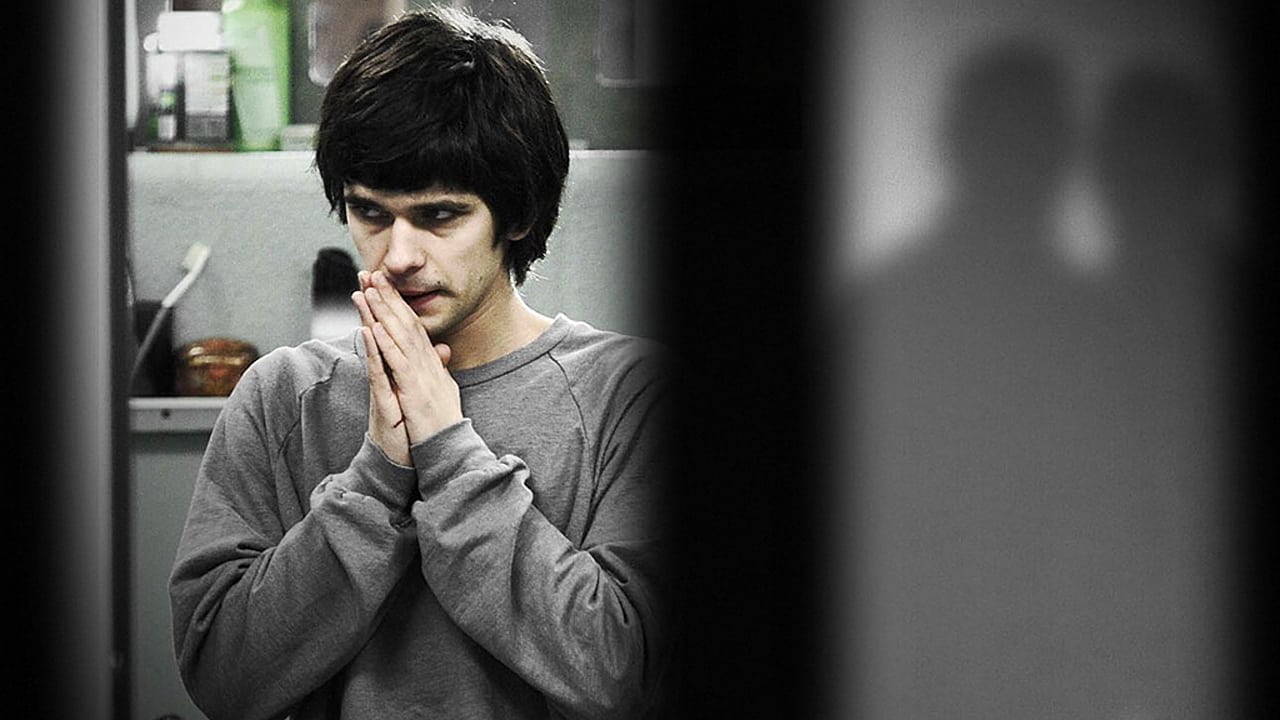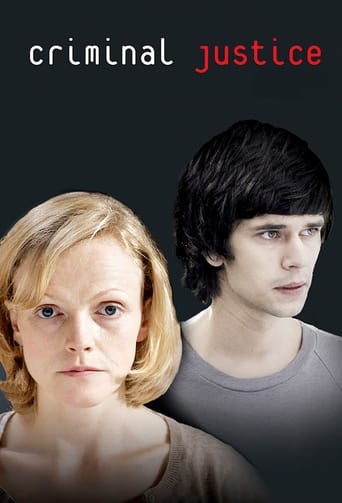



Excellent, Without a doubt!!
Best movie ever!
After playing with our expectations, this turns out to be a very different sort of film.
View MoreStrong acting helps the film overcome an uncertain premise and create characters that hold our attention absolutely.
View MoreSpoiler Alert: The crime is the least interesting thing about this story. I wish they would have simply forgotten about the murder and just focus on the other areas. The reason I'm watching this British series is because it has been redone on HBO in the States. Criminal Justice (The British The Night of) is a decent series. As an American I have a hell of a time with some of the accents and the lawyer guy (or whatever the hell he is) mumbles a lot and he is very difficult to understand at times. For such a small country they have a lot of messed up accents. If this is an accurate portrayal of the British court system then theirs is a lot more lacking than what we have in America. They just go back and forth between prosecution and defense instead of giving the prosecution case first and then the defense with witnesses called in some sort or order.I really wish they hadn't gone the route of a whodunit but they did and it was pretty stupid. I just didn't care by the end if he had killed her or not. I think it would have been much better if we never really knew who did it and the kid was i for a life in the can.
View MoreThe reviews here are a bit confusing, as several of them seem to be reviewing Part 2, which in America, anyway, is not on Netflix as yet.Part 1 concerns a young man, Ben Coulter (Ben Whishaw) who one night takes his dad's cab out in order to meet some friends. While the cab is stopped, a young woman named Melanie (Ruth Negga) gets in and wants to go to the seaside. Ben decides on a whim to take her. At the end of the evening, the two wind up at her place and have sex. The next morning, Ben wakes up in the kitchen. He goes upstairs, dresses, and tells Melanie he is going. Then he realizes she's dead and there's blood everywhere. Panicked, he rushes away, only to return to try to get rid of any sign that he was there. He's ultimately picked up, questioned, and later arrested for murder. Ben doesn't remember a darn thing about what happened.This is a very good miniseries, a little too packed in the last episode, but an excellent indictment of not only the justice system but the prison system, as the frightened Ben endures abuse and bullying from seasoned prisoners. He soon learns that even the guards are run by one prisoner, Freddie Graham, a terrifying man who manages to get everyone in his debt and then forces payback.Not that outside the prison, things are much better. Ben's father gets him high-prized solicitors who have no interest in Ben and just want to make a deal, and a barrister (Lindsay Duncan) who insists on a self-defense plea. Ben finally goes back to his original attorney, a public defender, a no-nonsense guy (Con O'Neill) who wants Ben to play the courtroom game but wants the truth as well.Ben's plight and Whishaw's sensitive performance are more than enough to hold interest. What's best about Ben is how he matures from the first to the last episode. Fantastic work. There is one shot of him and Melanie, sitting on the other side of an amusement park, in the dark, looking at the brilliant lights from the rides, two young people, enjoying life with everything in front of them. It's quite sobering.The rest of the acting is top-notch. Con O'Neill as Stone, the public defender, is wonderful as a streetwise solicitor with a husky voice and a big heart; Lindsay Duncan as a no-nonsense barrister who wants to cut to the chase; Pete Postlethwaite as Hooch, Ben's cell mate, a lifer who is there to protect Ben but has his own turmoil; and Bill Paterson as the gentle-speaking detective, Harry Box. That's only a few, but everyone is marvelous.The last episode is almost done in shorthand, packing in a ton of information and referring to incidents rather than showing them. And you have to watch and listen closely, or you'll be asking 'what happened'. Pay close attention.
View MoreI am a woman.And I, like another reviewer here, found the plot to be very stereo-typical and patronizing to most of the men portrayed in it. The only man not stereotypical in my view is Dr. Rose who is portrayed as weak and undecided which is patronizing. The women, on the contrary, are portrayed as strong, opinionated or misunderstood victims.This was written by a man. A man who is purportedly an ex-barrister. So is he right?Well, apparently much of the legal details of this production are muddled. So much so, that it is a point of contention with some. Therefore, is one really suppose to just "suspend belief" because it's a drama? Moreover, should one derive a true premise from it and then make assumptions based on a dramatic interpretation?Also, five night episodic treatment left it tedious and slow. Better if it had run three nights.It certainly gets one talking, but if anything, the greatest part of Criminal Justice was the performances. Maxine Peake, Matthew Macfadyen and Sophie Okonedo were brilliant.And, brilliant acting can make you believe anything!
View MoreEngrossing and involving, if highly fictional BBC drama shown over five consecutive nights, highlighting, or should that be low-lighting the British criminal justice system, effectively putting in the dock for viewers' consideration the police force, legal system and prison office, all of whom, on the "evidence" here, are all found wanting. The programme effectively combines three main narrative strands around these institutions of modern society, from the murder incident itself and the police detective (defective?) work alongside it, the trial process set at length in a court of law and perhaps most effectively the dehumanising incarceration process within the confines of prison. Some bits work better than others. The basic murder mystery is handled somewhat freely and brought to a fairly undramatic conclusion, although it's main purpose I think was likely to be in effectively highlighting the grey area of collusion which purportedly exists between lawman and lawbreaker, here personified by Bill Paterson's career cop being surprisingly in cahoots with the Mr Big, played by David Harewood in prison. I also found the depiction of the legal system somewhat hackneyed with characters and situations just too stereotyped and really more at home in the mediocre BBC legal soap opera "New Street Law" from last year. Examples of this are the young female junior barrister getting involved (albeit lightly) with the young defendant and her barnstorming attempt to pin the murder on the dead girl's father, without even checking if he had an alibi (as of course he did). What will stay in the memory most however are the scenes in prison where the vilification of the prison service is damned to hell. There are no upholders of the law in the jail, the prison officers invariably displayed as weak, conniving or both. I really can't or maybe don't want to believe things are that bad in UK prisons with a Freddie Graham character running the place as his own fiefdom. That said, it made for taut drama, with many memorable if shocking scenes of rampant moral corruption inside. The acting is mostly very good, Pete Postlethwaite unsurprisingly, given his pedigree, taking the honours with a completely credible performance as Hooch, the hard-bitten lifer who's learned to adapt and survive but ultimately at the expense of his own conscience, which he redeems but pays for in full at the end. There are other excellent turns too, principally by Con O'Neill as the Colombo-type gumshoe who plays the situation for all he can get, Bill Patterson as the too-long-in-the-tooth detective who now blurs the line between right and wrong and Lesley Duncan as the experienced cynical senior barrister who rides roughshod over her client's feelings to get the easiest and quickest result for her. Special mention must go though to Ben Whilshaw as the innocent, out-for-a-good-time youngster who is drawn into a latter-day Kafka-ish nightmare who emerges at the end physically intact but obviously deeply affected by his horrific experiences and who in the last scene now feels outcast from the friendly football kick-about in which he participated in the opening scenes. He has a face reminiscent of John Lynch in "Cal" or David Bradley in "Kes", and portrays what must have been a gruelling role with conviction and realism. On the whole an excellent thought-provoking drama, let down only slightly by its probably necessary concessions to TV drama with perhaps more cliffhangers than would probably be the case with more typical, I would imagine, hum-drum real-life criminal cases. One caveat - would the BBC please stop its infuriating habit of trailing the succeeding programme at the end of the current programme. It's unnecessary and insulting to viewers' intelligence, especially in this instance when the programme was shown over successive nights.
View More